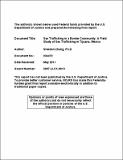| dc.description.abstract |
The main questions in this study included: 1. To what extent, at what stage, and on what premises are deception, fraud, force, or coercion being used in the transportation of prostitutes into Tijuana? 2. To what extent and with what methods are human traffickers and sex industry operators managing trafficking activities and controlling prostitutes? 3. How do human traffickers and sex industry operators organize themselves and engage in business transactions? 4. What policy implications can be drawn to improve efforts by law enforcement and social service agencies to deter human trafficking and assist victims? This study followed the qualitative research traditions of in-depth interviews with semi-structured and open-ended questions, field observations, and naturalistic conversations with major players in the prostitution business, law enforcement and advocacy groups. Included in the data are interviews with 220 women from the sex industry, 92 sex trade facilitators, 30 government/law enforcement officials, and 20 community-based service providers. This study found that women from a wide variety of social and economic backgrounds entered into commercial sex. The vast majority of the women interviewed in this study chose prostitution as a means to achieve personal and familial financial ends. The sex trade facilitators appeared to be enterprising individuals who relied on either existing businesses in the red light district or initiating their own entrée into the sex trade. Law enforcement agencies on both sides of the border expressed concern about sex trafficking, and the majority of these officials believed much more could be done to curtail sex trafficking activities. Social service providers and advocacy groups were the most vocal respondents in this study. According to these social service agencies, sex trafficking in Tijuana was rampant and victims were numerous. |

